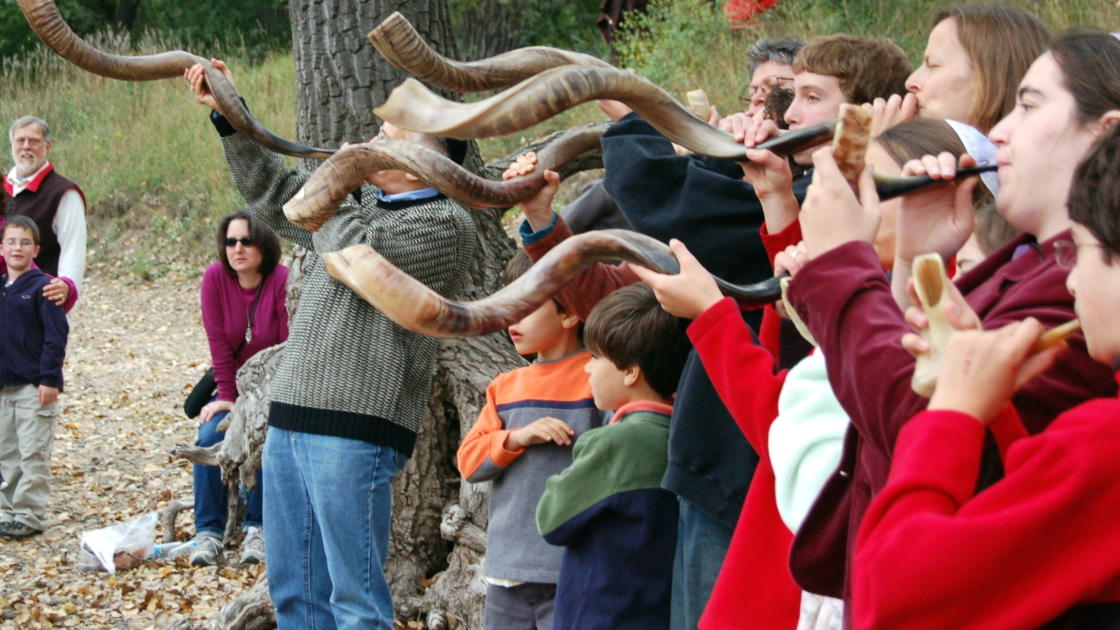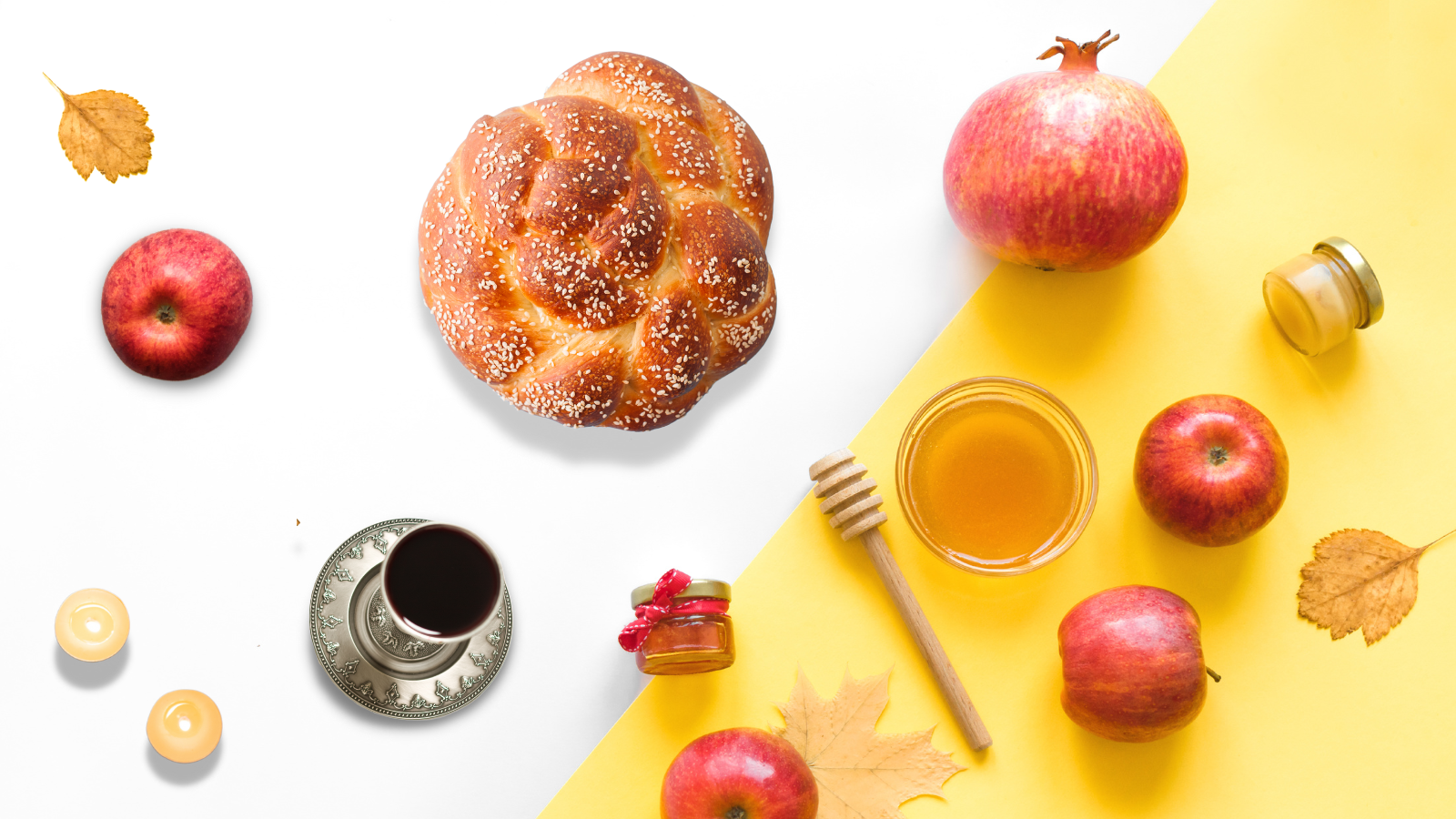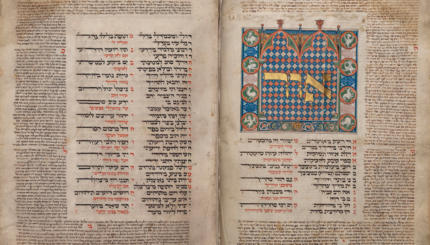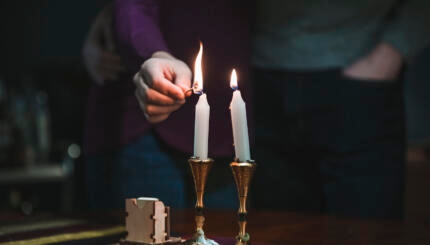The first day of Rosh Hashanah, the Jewish new year, is joyously marked through festive meals, special holiday prayers, blowing the shofar and the Tashlich ceremony in which sins are symbolically cast off by throwing pieces of bread into a body of water.
When Rosh Hashanah falls on Shabbat, there are not one but two simultaneous holidays to celebrate. For that reason, candle-lighting blessings and Kiddush are adjusted to acknowledge both sacred occasions. Additionally, some Rosh Hashanah traditions involve performing a melachah, an action that is forbidden on Shabbat, and therefore are omitted when Rosh Hashanah begins on a Friday night. There are also other liturgical adjustments. Below is a summary of what changes when Rosh Hashanah and Shabbat overlap.
Lighting candles
The beginning of Rosh Hashanah and Shabbat are both marked by lighting candles. When Rosh Hashanah begins on a Friday night, candles are lit and a blessing for both holidays is recited. This is the Sephardi version of the blessing:
בָּרוּךְ אַתָּה יְיָ אֱלֹהֵינוּ מֶֽלֶךְ הָעוֹלָם אֲשֶׁר קִדְּשָׁנוּ בְּמִצְוֹתָיו וְצִוָּנוּ לְהַדְלִיק נֵר שֶׁל שַׁבָּת וְיוֹם טוֹב
Baruch atah Adonai, Eloheinu Melech ha-olam, asher kidshanu b’mitzvotav vitzivanu l’hadlik ner shel Shabbat v’yom tov.
Blessed are You, Lord our God, Ruler of the world, who sanctifies us with mitzvot and commands us to kindle the lights of Shabbat and the festival.
The Ashkenazi version is nearly identical, but adds an extra word shel (meaning “of”):
With your help, My Jewish Learning can provide endless opportunities for learning, connection and discovery.
בָּרוּךְ אַתָּה יְיָ אֱלֹהֵינוּ מֶֽלֶךְ הָעוֹלָם אֲשֶׁר קִדְּשָׁנוּ בְּמִצְוֹתָיו וְצִוָּנוּ לְהַדְלִיק נֵר שֶׁל שַׁבָּת וְשֶׁל יוֹם טוֹב
Baruch atah Adonai, Eloheinu Melech ha-olam, asher kidshanu b’mitzvotav vitzivanu l’hadlik ner shel Shabbat v’shel yom tov.
Blessed are You, Lord our God, Ruler of the world, who sanctifies us with mitzvot and commands us to kindle the lights of Shabbat and of the festival.
Since the Rosh Hashanah candles were lit for the first time that year, in all traditions the Shehechiyanu blessing is then recited:
בָּרוּךְ אַתָּה יְיָ אֱלֹהֵינוּ מֶלֶךְ הָעוֹלָם שֶׁהֶחֱיָינוּ וְקִיְּמָנוּ וְהִגִּיעָנוּ
Baruch Atah Adonai, Eloheinu Melech Haolam, shehechiyanu, v’kiy’manu, v’higianu lazman hazeh.
Blessed are You, Lord our God, who has given us life, sustained us and allowed us to arrive in this moment.
Kiddush
When Rosh Hashanah begins on a Friday night, the blessing over the wine is also different. The first paragraph of the standard Friday night kiddush is added to the standard festival kiddush, and certain words are added that include mention of Shabbat. The kiddush recited on Saturday night is also adjusted to reflect the fact that Shabbat is ending but Rosh Hashanah continues for another day. An abridged version of Havdalah, the ritual marking the conclusion of Shabbat, is appended to the end of the kiddush, and in place of the regular blessing that acknowledges God who “distinguishes between the sacred and the profane,” the words are adjusted to “between the sacred and the sacred.” You can find the full text of the Rosh Hashanah Kiddush in a mahzor.
No shofar blowing
Jewish law requires that the shofar is blown on Rosh Hashanah at least 30 times (Rosh Hashanah 34a), although many communities sound the shofar as many as 100 times on each day of Rosh Hashanah. But when Rosh Hashanah coincides with Shabbat, the shofar isn’t blown in most Ashkenazi congregations.

According to the Talmud (Rosh Hashanah 24b), this practice dates back to Temple times, when the shofar wasn’t blown on Shabbat. The rabbis explain that the talmudic sages instituted this prohibition not because the actual blowing of the shofar breaks Shabbat, but out of fear that a shofar blower might accidentally violate Shabbat by carrying the shofar beyond the permissible area.
In 1913, the American Reform movement ruled that the shofar could be blown on Shabbat, and many Reform communities follow this decree today. This may be influenced by the fact that Reform Jews typically keep only one day of Rosh Hashanah. Even in Israel, where many festivals are only observed for one day, Rosh Hashanah is observed for two days. So for most communities, there will still be an opportunity to hear the shofar on the second day. But if Reform Jews who keep only one day of Rosh Hashanah didn’t blow the shofar if the holiday coincided with Shabbat, they wouldn’t hear it at all. An additional rationale in the 1913 responsa is that synagogues are meant to stand in for the original Temple in Jerusalem, where the shofar was blown on Rosh Hashanah when it coincided with Shabbat.
In some communities, Tashlich is delayed
Customarily, Jewish communities will gather at a flowing body of water during the afternoon on the first day of Rosh Hashanah for the Tashlich ceremony. The ceremony includes reading a passage from the Book of Micah, as well as a selection of psalms, and throwing breadcrumbs into a live body of water to symbolically cast off one’s sins.
If the first day of Rosh Hashanah falls on Shabbat, Ashkenazi Jews do Tashlich on the second day. Sephardi Jews, as well as some non-Orthodox Ashkenazi Jews, perform Tashlich on the first day, even on Shabbat.
Regardless of when Rosh Hashanah falls, many Jewish communities hold that Tashlich can be performed any time between Rosh Hashanah and Yom Kippur.
No cooking
When Rosh Hashanah doesn’t fall on Shabbat, cooking food that will be consumed on the same day is permitted. But if Rosh Hashanah begins on a Friday night, any form of cooking is prohibited, since it violates the laws of Shabbat. Therefore, meals for the first day of Rosh Hashanah must be prepared before Friday night.
Liturgical adjustments
When Rosh Hashanah falls on Shabbat, the prayers are adjusted — with both additions and omissions — to reflect the double holiday. For example, because petitioning God is not permitted on Shabbat, the iconic prayer Avinu Malkeinu is omitted from the service. In addition, Kabbalat Shabbat is shortened on Rosh Hashanah.
Several Shabbat prayers are also incorporated into the Rosh Hashanah liturgy, especially during the recitation of the Amidah and Birkat Hamazon (Grace After Meals). A mahzor will include the Shabbat additions, but pay close attention — the additions may be noted in parentheses or italics and can be easy to miss.
Rosh Hashanah will coincide with Shabbat in the coming years: 2023, 2026, 2027, 2030, 2033, 2040.
Want to learn more about the High Holidays? Sign up for a special High Holiday prep email series.



